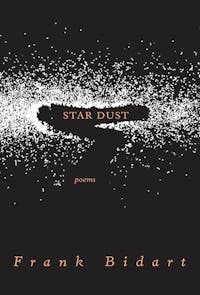Star Dust
Poems
 Download image
Download image
ISBN10: 0374530335
ISBN13: 9780374530334
Trade Paperback
96 Pages
$15.00
CA$17.50
A National Book Award Finalist
In 2002, Frank Bidart published a sequence of poems, Music Like Dirt, the first chapbook ever to be a finalist for the Pulitzer Prize. From the beginning, he had conceived this sequence as the opening movement in a larger structure—now, with Star Dust, finally complete.
In this profound and unforgettable new book, the dream beyond desire (which now seems to represent human destiny) is rooted in the drive to create, as the temporal being fights for its survival by struggling to make a life beyond itself. Bidart is a poet of passionate originality, and Star Dust shows that the forms of this originality continue to deepen and change with each new book.
Reviews
Praise for Star Dust
"Bidart is dazzled, confounded and compelled by words, and he wants us to feel the same way . . . [He] has a fastidious sense of poetic craft, but he has faith in primal energies too . . . What Bidart proposes, to balance the moral and aesthetic risks that he takes in Star Dust, is the largest possible conception of poetry's powers."—Langdon Hammer, The New York Times Book Review
"Key poems that speak directly to our age—a kind of post-millennium poetry of engagement."—Megan Harlan, San Francisco Chronicle
"This is writing of high drama and thrilling beauty, recalling Webster and Marlowe in the dark extravagance of its sounds . . . It is worth remarking how engagingly readable his poems are, how often they delight through the sheer suspense of their narratives. This is not something, in the early twenty-first century, one can often say of our poets . . . It is this ferociousness—in his increasingly constant pursuit of beauty, his refusal of the comfort of our common illusions, and his devotion, however despairing, to the ideal of an intelligible life—that grants Bidart, among our current poets, an eminence almost without rival."—Garth Greenwell, Parnassus
"Frank Bidart's new collection carries the imprimaturs of greatness . . . [Bidart is] not only one of our most challenging poets, but also one of our most responsible."—Jonathan Weinert, Harvard Review
"The three 'Hours of the Night' are as strange as any poem that has ever been written. They feel at once capricious and inevitable, idiosyncratic and conversant with the central traditions of English poetry. They are deeply threatening, and, as a result, their consolation is profound. Their dark view of fate is dramatized with a rigor impossible to second-guess, yet the poems feel mercilessly generous, open to every aspect of human thought and feeling. I suspect that we are witnessing the creation of one of the permanent works of art of our time."—James Longenbach, Salmagundi
"Just as art has impelled the poet through the remaking of his self, so Bidart has remade the tradition of poetry in English. Star Dust is not merely 'about' the desire to create: It exists as a superb embodiment of that urge . . . No living poet writes with Bidart's fusion of emotional ferocity and formal exactitude, of grand ambition and creaturely attentiveness. This is his strongest book."—Peter Campion, The Boston Globe
"'We are creatures who need to make,' writes Bidart, succinctly expressing the argument of his recent chapbook, Music Like Dirt, which comprises one half of this new volume. Music Like Dirt was the first chapbook ever to be nominated for a Pulitzer Prize, deservedly so. In it, Bidart, with characteristic ruthlessness, outlines an aesthetic theory so basic that it applies to all of us. The theory begins with Bidart's long-standing interest in fusing the body and the mind, so that the body becomes the fundament of vision and spirit. It's a notion captured famously in a line from Bidart's Desire: 'I hate and-love. The sleepless body hammering a nail nails / itself, hanging crucified.' Now Bidart extends the theory further to fuse existence with creativity: 'But being is making: not only large things, a family, a book, a business: but the shape we give this afternoon, a conversation between two friends, a meal.' Not surprisingly, tropes of sculpture, where art and corporeality meet most literally, dominate this collection. The body that would crucify itself now sculpts itself, albeit violently: 'The stone arm raising a stone hammer / dreams it can descend upon itself.' These themes bleed into the more personal lyrics present in the second half of this volume, most notably in 'Curse,' a poem of articulate fury addressed to the masterminds of September 11. Sculpture and self-creation resume the stage in 'The Third Hour of the Night,' a long poem in the voice of Benvenuto Cellini, renaissance sculptor and murderer. Throughout the collection, Bidart alternates between prosy explication and knotted, unpunctuated verse that enacts the poet's chief image: 'within stone / the mind writhes.' Bidart has recently emerged from the long and relatively thankless editorship of Robert Lowell's collected poems; Star Dust redoubles his claim to his own fame."—Publishers Weekly



